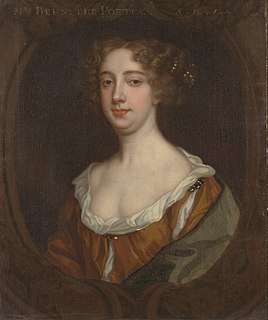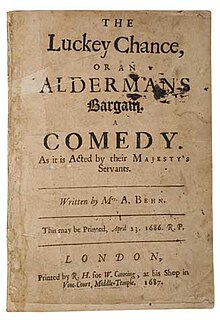
Astraea, Astrea or Astria, in ancient Greek religion, is a daughter of Astraeus and Eos. She is the virgin goddess of justice, innocence, purity and precision. She is closely associated with the Greek goddess of justice, Dike. She is not to be confused with Asteria, the goddess of the stars and the daughter of Coeus and Phoebe. The main belt asteroid 5 Astraea is named after her, and her name was also suggested for the planet Uranus.

Aphra Behn was an English playwright, poet, prose writer and translator from the Restoration era. As one of the first English women to earn her living by her writing, she broke cultural barriers and served as a literary role model for later generations of women authors. Rising from obscurity, she came to the notice of Charles II, who employed her as a spy in Antwerp. Upon her return to London and a probable brief stay in debtors' prison, she began writing for the stage. She belonged to a coterie of poets and famous libertines such as John Wilmot, Lord Rochester. Behn wrote under the pastoral pseudonym Astrea. During the turbulent political times of the Exclusion Crisis, she wrote an epilogue and prologue that brought her into legal trouble; she thereafter devoted most of her writing to prose genres and translations. A staunch supporter of the Stuart line, she declined an invitation from Bishop Burnet to write a welcoming poem to the new king William III. She died shortly after.

Oroonoko: or, the Royal Slave is a work of prose fiction by Aphra Behn (1640–1689), published in 1688 by William Canning and reissued with two other fictions later that year. It was also adapted into a play. The eponymous hero is an African prince from Coramantien who is tricked into slavery and sold to European colonists in Surinam where he meets the narrator. Behn's text is a first-person account of Oroonoko's life, love, rebellion, and execution. Oroonoko: or, the Royal Slave “centers on the unlucky love story of Oroonoko, an African prince, and the beautiful Imoinda.”
Janet Margaret Todd OBE is a British academic and author. She was educated at Cambridge University and the University of Florida, where she undertook a doctorate on the poet John Clare. Much of her work concerns Mary Wollstonecraft, Jane Austen, and their circles.
Aphra is a genus of moths in the subfamily Arctiinae. The genus was described by Watson in 1980.

Love-Letters Between a Nobleman and His Sister is a three-volume roman à clef by Aphra Behn playing with events of the Monmouth Rebellion and exploring the genre of the epistolary novel. The first volume, published in 1684, lays some claim to be the first English novel. Some scholars claim that the attribution to Behn remains in dispute. The novel is "based loosely on an affair between Ford, Lord Grey of Werke, and his wife's sister, Lady Henrietta Berkeley, a scandal that broke in London in 1682". It was originally published as three separate volumes: Love-Letters Between a Noble-Man and his Sister (1684), Love-Letters from a Noble Man to his Sister: Mixt with the History of Their Adventures. The Second Part by the Same Hand (1685), and The Amours of Philander and Silvia (1687). The copyright holder was Joseph Hindmarsh, later joined by Jacob Tonson.
"The Disappointment" is a poem written by Aphra Behn. It was first published in 1680 in the Earl of Rochester's Poems on Several Occasions and originally was believed to be Rochester’s own work. However, four years later, the poem was re-published in Aphra Behn’s Poems on Several Occasions and she received proper credit.
Aphra flavicosta is a moth of the subfamily Arctiinae. It was described by Gottlieb August Wilhelm Herrich-Schäffer in 1855. It found in Argentina.
Aphra nyctemeroides is a moth of the subfamily Arctiinae. It was described by Francis Walker in 1869. It found in Brazil.
Alyssa Wong is an American writer of speculative fiction, comics, poetry, and games. Wong is a recipient of the Nebula Award, World Fantasy Award, and Locus Award.

Doctor Chelli Lona Aphra, or simply Doctor Aphra, is a fictional character in the Star Wars franchise. Created by writer Kieron Gillen, artist Salvador Larroca, and editors Jordan D. White and Heather Antos, she first appeared in Marvel Comics' 2015 Darth Vader comic book series. Aphra became a breakout character, and began appearing in her own ongoing spin-off comic series, Star Wars: Doctor Aphra, from 2016 to 2019, before relaunching in 2020. She is a morally questionable, criminal archaeologist initially employed by Darth Vader in his efforts to replace Palpatine as leader of the Galactic Empire, who later goes into hiding from the former after betraying him to the latter and faking her death, briefly establishing a love–hate relationship with Imperial officer Magna Tolvan. Supported by droids 0-0-0 and BT-1, and later by her former partner Sana Starros, she is considered a war criminal by the Rebel Alliance. Aphra is the first original Star Wars character not from the films to lead a Marvel comic series.

John Hoyle was a bisexual lawyer in London and a lover of the writer Aphra Behn. Behn's relationship with Hoyle was the "dominating one" in her life.

The Luckey Chance, or an Alderman's Bargain by Aphra Behn is a 17th-century comedy in five acts. The play was first staged in the Spring of 1686. Its main theme is romance and it includes devices such as impersonation and disguise, and a masque including music and dancing. Some songs were composed by John Blow.
The Town-Fopp: or, Sir Timothy Tawdrey is a Restoration comedy written by Aphra Behn and first staged in 1676. It deals with an unhappy marriage and its dissolution.
Agnes de Castro; or, The Force of Generous Love, is a tragic novel written by Jean-Baptiste de Brilhac. An English translation by Aphra Behn was published in 1688. It dramatizes the life and murder of Inês de Castro, the lover and posthumously recognized wife of King Peter I of Portugal.
John Bowman (1651–1739) was a British stage actor. He began his career in the Duke's Company at the Dorset Garden Theatre. In 1692 he married Elizabeth Watson, who acted under the name Elizabeth Bowman. He later switched to act at the Drury Lane Theatre. He is also referred to as John Boman.
Joseph Williams was an English stage actor of the seventeenth and early eighteenth century.
Elizabeth Currer was an Irish stage actress of the Restoration Era. She was a member of the Duke's Company during the 1670s and subsequently part of the merged United Company from 1682. Although she was likely acting in London several years earlier than this, her first known role was in The Conquest of China in 1675. Due to the irregular spelling of the time her surname is sometimes written as Carrier, Corer and Currier amongst other variants.
Thomas Percival or Percivall was an English stage actor of the seventeenth century. He was a member of the Duke's Company from 1671 to 1682 and then the merged United Company until 1686. Throughout his career he was confined to playing supporting roles, never graduating to major parts. He was the father of the actress Susanna Verbruggen. In 1693, following his retirement from the stage, he was arrested for coin clipping, a capital crime, for which he was sentenced to hang at Tyburn. The intercession of his daughter with Mary II saw his sentence commuted to transportation, but before he reached Portsmouth he died of natural causes.
John Crosby was an English stage actor of the Restoration Period. He first recorded performance is in 1662 when he appeared in Ignoramus at Whitehall Palace, likely as a child actor. It was further eight years before he was solidly established in the Duke's Company in 1670 beginning with The Forc'd Marriage by Aphra Behn. He became a regular with the company over the following decade, often playing young lover roles. He retired from the stage in 1679 and later became a justice of the peace for Middlesex. He died on 8 April 1724 and was buried in St Sepulchre.






